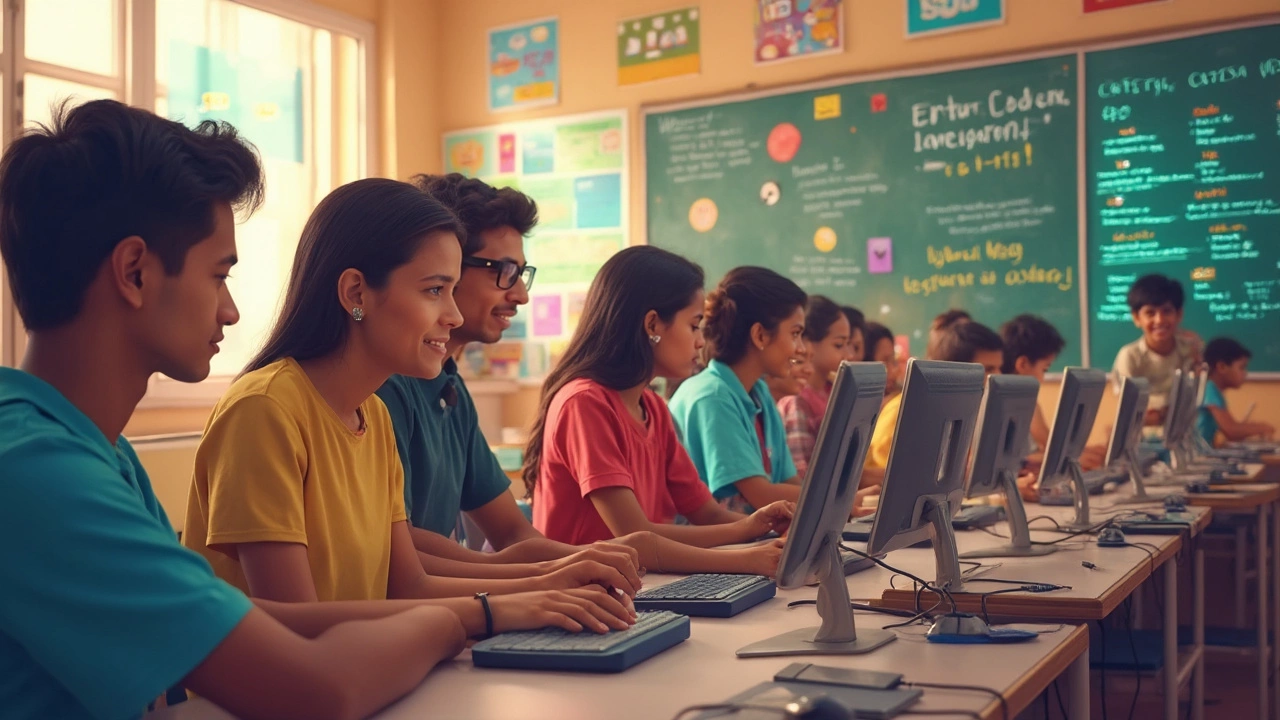Coding vs Programming: What’s the Real Difference?
 May, 22 2025
May, 22 2025
Most folks use “coding” and “programming” like they’re the same thing. But if you’re signing up for a coding class or thinking about getting serious in tech, it’s good to know the difference. Knowing which skill does what can save you time, money, and a lot of frustration down the road.
If you’ve ever wondered if “coding” is just a cooler word for “programming,” you’re not alone. Here’s the thing—coding usually means you’re writing instructions (code) in a language the computer understands. Programming? That’s more about solving problems, coming up with the game plan, and building things that actually work from start to finish.
This isn’t just tech talk. If you want to build your own app, help a friend automate a spreadsheet, or just figure out what to write on your resume, it helps to get these terms right. If you’re new, don’t worry. You’re in the right place to learn what matters and avoid the mix-ups that trip up a lot of beginners.
- What is Coding?
- What Makes Programming Different?
- Where Coding and Programming Overlap
- Which One Should You Learn First?
- Smart Tips for Beginners
What is Coding?
Coding is the process of writing step-by-step instructions that a computer can follow. Think of it like following a recipe—except the recipe is written in a computer language, such as Python, JavaScript, or C++. These instructions are called "code," and the people who write them are called coders.
You might hear people use "coding" and "programming" to mean the same thing, but coding is really the part where you’re actually typing out the commands. You're telling the computer exactly what to do, one step at a time. For beginners, this is usually the first thing you learn in any coding class. It’s about getting a hang of the basics—what goes where, why you need punctuation, and how to get the computer to spit out “Hello, World!” on your screen.
Coding isn’t all glamorous—sometimes it’s just fixing missing semicolons or making sure things are in the right order. But it’s where every app, game, or website starts out. A lot of classic coding problems, like making a calculator or a login box, build the skills you’ll need for bigger projects.
Here are some common things people use coding for:
- Building web pages (HTML/CSS/JavaScript)
- Automating boring tasks (Python scripts)
- Writing simple games
- Creating tools like calculators, to-do lists, or chatbots
If you’re curious about which languages people use the most, take a look at this quick rundown from Stack Overflow’s 2024 Developer Survey:
| Language | % of Developers Using It |
|---|---|
| JavaScript | 63.1% |
| Python | 49.4% |
| HTML/CSS | 58.2% |
| Java | 32.6% |
| C# | 27.3% |
Coding gives you instant feedback. If your code has an error, your computer won’t do what you asked. That’s how a lot of people learn—they try, fail, and try again. So if you mess up, don’t sweat it. Debugging is part of the process, and it’s a great way to pick up new skills fast.
What Makes Programming Different?
If coding is about typing commands that the computer follows, then programming is playing the whole game, not just moving the pieces. Programming is the bigger job. It means figuring out what the software should do, how to break the problem down, and making sure the whole thing actually works in real life, not just on paper.
Think about this: a coder might know how to write a line that adds two numbers. A programmer is the one who decides why we’re adding those numbers, how we get them in the first place, what happens if someone puts in a letter by mistake, and what the program should do if everything goes wrong. It’s designing, building, and testing all rolled into one job.
Programming usually involves creating plans called algorithms, choosing which coding language to use, and sometimes working with others to get a full project finished. Here’s what programmers deal with on a daily basis:
- Designing systems and breaking down complex problems
- Making flowcharts or diagrams to plan how everything fits together
- Testing for bugs and fixing them when things go sideways
- Working with databases, user input, and even security
- Making sure the programs are easy to update later on
This is where the big difference comes in: programming is about building full solutions. Coding is one tool in a programmer’s toolbox, but programming is the whole workshop. And in real life, people who know how to program are the ones building websites, apps, and all the tools you use every day—so if you want to create something from scratch or work on bigger projects in a team, you’ll want to get into programming.

Where Coding and Programming Overlap
Alright, so if you’re thinking coding and programming completely live in separate worlds, not true. The truth is, there’s a huge gray area where they meet—and most people working in tech jump back and forth all the time. No matter what you call it, both involve actually writing code to get computers to do stuff.
The big connection? Both require you to speak the language of computers. For example, whether you’re just fixing a small bug in a website (that’s coding) or designing a whole new website from scratch (that’s programming), you’ve got to type out real instructions in languages like Python, JavaScript, or Java.
- Debugging is something both coders and programmers do every day. Spotting errors and fixing them is often a crossover task.
- Testing code isn’t just for full-blown software engineers. Writing simple tests to make sure things work is something you’ll do whether you’re learning to code or programming a big project.
- Updating and maintaining projects requires both skills. Whether you wrote the original code or not, keeping it running is a job for everyone in this space.
If you look at tech job postings, coding skills are nearly always listed—even if the job is mostly about programming. Companies expect you to write code and solve problems, all in one go.
Here’s a quick look at how often coders and programmers share these tasks in real jobs. Check out this sample from a 2024 industry survey:
| Task | Coders | Programmers |
|---|---|---|
| Writing new code | 98% | 100% |
| Debugging issues | 92% | 97% |
| Testing code | 82% | 89% |
| Designing systems | 23% | 85% |
So, these skills and tasks are more connected than most people think. The bottom line: learning one will always help with the other, and most projects need both to really work.
Which One Should You Learn First?
If you’re starting from scratch, go with coding first. It’s like learning the alphabet before you write essays. Coding is about understanding the basics: the rules, the structure, and how to get things working step by step. Schools like Code.org and Khan Academy always start with coding because it builds your confidence quickly. You see results almost right away—your first website, calculator, or even a simple game.
Programming is a bigger leap. It mixes coding with designing, analyzing problems, and figuring out the best way to solve them so that a machine can understand. That’s why computer science degrees usually have you writing lots of small programs in your first year—professors want you to get comfy coding before you take on bigger programming tasks.
“You wouldn’t build a house without knowing how to use a hammer. Same thing here: learn to code before you try to program.” — Bill Gates, Microsoft co-founder (from a 2019 interview with GeekWire)
The truth is, most people learn these skills side by side after a few weeks. But if you want a smoother ride, do this:
- Start with coding to get comfortable with basic commands and syntax.
- Once the basics feel easy, try solving small everyday problems with code—that’s your bridge to programming.
- Don’t rush. Even pro software engineers say they learn new stuff every week.
| Skill | Typical Learning Time (Beginner Level) | Most Used Tools/Languages |
|---|---|---|
| Coding | 2-6 weeks | Scratch, Python, HTML/CSS |
| Programming | 2-6 months | Python, Java, C++, JavaScript |
If you’re joining a coding class, double-check if they cover both. Some only teach pure coding, while others mix in programming logic right from the start. Ask what projects you’ll build—real projects are the fastest way to level up.

Smart Tips for Beginners
Just getting started and feeling lost in all the options? It’s normal. There are tons of free resources, but it’s easy to get stuck trying to figure out where to actually begin. Here’s what’ll make it less confusing:
- Pick one language, stick with it for a bit. Python is the most recommended starting point—90% of university intro coding classes in the US use it. It’s simple, clean, and tons of jobs use it, so you can see results fast.
- Practice in small chunks every day, not just once a week. Even 20 minutes daily beats three hours on a random Saturday. Consistency wins in the long run.
- Join some kind of group, even if you’re shy. People in coding bootcamps or online forums (like freeCodeCamp) report finishing projects 40% more often because they have help and motivation.
- Build little projects instead of just watching videos. Make a calculator, a to-do list, or automate something simple. Doing is way better than only reading or watching.
- Don’t panic if you hit bugs. Coding errors happen, even to pros. Stack Overflow has over 23 million questions—and counting. That’s a lot of problems solved, and your answer’s probably already there.
Wondering how your progress compares? Check out this quick table:
| Skill | Typical Time to Learn Basics | Most Popular First Project |
|---|---|---|
| Python | 2-4 weeks | Calculator |
| JavaScript | 3-5 weeks | Interactive web button |
| HTML/CSS | 1-2 weeks | Personal web page |
If you’re aiming for a job down the road, start keeping track of what you build. A simple portfolio site or even a list on GitHub helps a lot during job hunts, showing real proof you’ve been putting your new coding skills into practice.